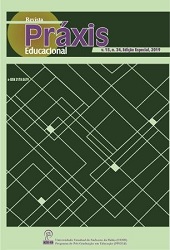ESTUDOS MONGÓIS NA RÚSSIA DA SEGUNDA METADE DO SÉCULO XIX Y INÍCIO DOS SÉCULOS XX: PESSOAS E DESTINOS DO PATRIMÔNIO CIENTÍFICO
DOI:
https://doi.org/10.22481/praxisedu.v15i34.5797Keywords:
Mongolian studies, People and destinies, Scientific heritageAbstract
The article highlights some aspects of the development of the Russian scientific school of Mongolian studies in the second half of XIX - the beginning of XX centuries – the time of a significant contribution of the St. Petersburg center to its history, which strengthens its position in the middle of the XIX century as a result of the transfer of the Eastern Department of Kazan University in St. Petersburg one. The formation of the educational process at the Mongolian-Kalmyk Department in St. Petersburg is in many respects a noble work of the professors transferred from Kazan, first of all, Alexander Vasilyevich Popov, then his student at Kazan University and colleague at St. Petersburg University Konstantin Fedorovich Golstunsky, who brought up his brilliant students-in consequence the authoritative Mongolian scholars, among them Alexey Matveevich Pozdneev, whose life and fate connected two epochs in the history of Russia. A. M. Pozdneev had a chance to work in the post-October period, covering the period from 1917 to 1930, when the traditions of the former Imperial scientific school were still preserved with the active formation of the new Soviet science. Through the prism of the biography of one of the outstanding orientalists of the Russian scientific school Alexey Matveevich Pozdneev, the features characterizing the life and activities of Russian scientists after the 1917 revolution, many of whom tried to find themselves in new conditions of existence, are traced. The fate of most of them, as well as A. M. Pozdneev, was tragic, this was facilitated by the extraordinary historical circumstances of the revolution and the civil war, exacerbated by epidemics of deadly diseases, which put scientists in unbearable conditions of existence. For belonging to the old scientific school, many were arrested and physically destroyed, and their scientific heritage was forgotten or subjected to distortion, denial. It should be noted that the tragedy of the scientific heritage, and in general, research activities, is inherent in the Mongol scholars of the Imperial period, it can be seen through the biographies of A.V. Popov and K.F. Golstunsky, whose works were not received proper distribution. Scientific and pedagogical work of A.V. Popov was interrupted by appointment to the post of Inspector of schools, and the biography and legacy of K.F. Golstunsky is not adequately covered, although he was at the head of Russian Mongol studies for many years.
Downloads
Metrics
Downloads
Published
How to Cite
Issue
Section
License
You are free to:
Share - copy and redistribute the material in any medium or format; Adapt - remix, transform, and build from the material for any purpose, even commercially. This license is acceptable for Free Cultural Works. The licensor cannot revoke these freedoms as long as you follow the terms of the license.
Under the following terms:
Attribution - You must appropriately give credit, provide a link to the license, and indicate if any changes have been made. You may do so in any reasonable way, but not in a way that suggests that you or your use is endorsed by the licensor.
There are no additional restrictions - You cannot apply legal terms or technological measures that legally restrict others to make any use permitted by the license.










